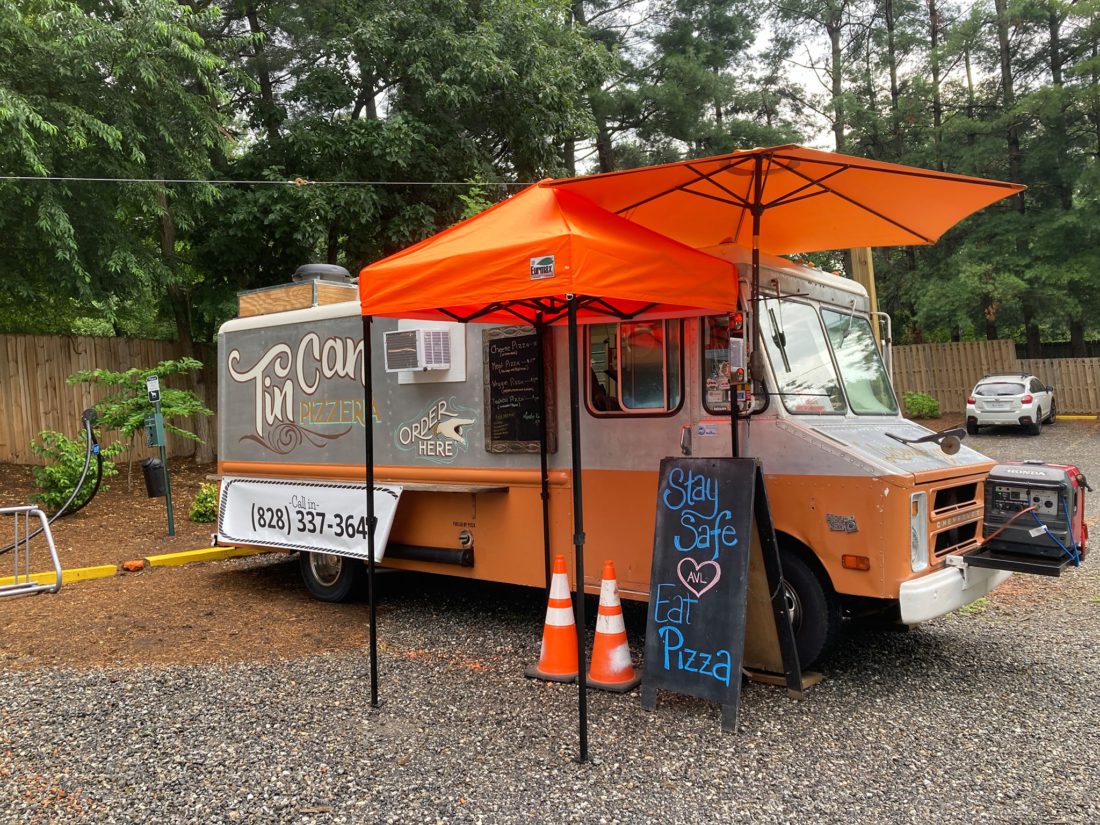Have truck, will travel might idealistically describe the food truck business, but the reality is that securing a legal parking space for serving tacos, pizza, barbecue and other mobile favorites has long been a challenge in Asheville and Buncombe County.
“Generally, food trucks were limited to certain commercial areas,” says Ben Woody, director of the Asheville’s Development Services Department. When Asheville began allowing food trucks to operate within the city in 2012, they were not permitted in residential areas or within the central business district (downtown Asheville). Instead, many trucks kept regular, weekly hours at breweries, a reliable arrangement until taprooms were ordered to close in March due to COVID-19.
In response, Mayor Esther Manheimer issued a revision to the city’s State of Emergency order on March 24 allowing food trucks more leeway on where they could park. “With the exception of the [central business district], we essentially let food trucks out into a wider world, thinking it was helpful to them and a way to bring food to people who were sheltering at home,” Woody explains. Those relaxed rules mean food trucks can operate at apartment complexes, community centers, libraries, school properties, places of worship or on vacant property as long as they are more than 50 feet from an occupied residence — and “not set up in the middle of the street,” he clarifies.
AJ Gregson, owner of Black Bear BBQ restaurant and food truck, was a step ahead after closing his dining room March 16. “I started scratching my head on where I could be that had the most people and operate safely,” he recalls. “People were sheltering at home at that point, and we felt like we could break up the monotony of whatever people were cooking. We started going to apartment complexes, and at that time, the truck really saved us.”
Chris and Stephanie Cogswell have been cooking seasonal, local, creative cuisine from their Appalachian Chic food truck since 2015 at New Belgium, Highland, Pisgah and Noble Cider breweries. “When they shut down, I Googled apartment complexes in Asheville, targeted the bigger ones and started calling,” says Chris. “I probably called 30, and the majority embraced the idea. We also had places reach out to us, like Blue Ridge Community College and WNC Community Health. People were thrilled to have options.”
In addition to meeting the usual state and county sanitation requirements, local food trucks are committing to new safety measures. “We switched from plates to boxing everything up, stopped taking cash, secured our chip reader outside the truck and set up an online Square store so people could order, pay and set a pickup time,” Chris says.
Gregson jokes that by their nature, food trucks seem to offer customers a sense of security. “We have the height of the truck going for us, and the wall between us,” he points out. “People can stand 6 feet back from the window and yell their order at me if it makes them feel better.”
Chris Maness spent 20 years turning lemons into MacDaddy’s Organic Lemonade, doing a brisk business at events, music shows and festivals in Western North Carolina and South Florida. It all went sour this spring thanks to COVID-19, but it turned out to be good timing that he and partners Thomas Garrett and Jordan Wilson had taken over the 8-year-old Tin Can Pizzeria in February.
They upgraded the truck with new equipment, increased the pizza size to 12 inches, changed the dough recipe, added more locally sourced ingredients, then operated for about a month at Wedge Brewery until it shut down in mid-March. Even so, “Having the truck turned out to be a blessing after festivals and events were wiped out and MacDaddy’s was out of business,” Maness says.
Maness, Garrett and Wilson initially began serving lunch and dinner from Tin Can Pizzeria at the Kounty Line-Reynolds convenience store. But after adding safety precautions, including a Plexiglass shield, single-use boxes to replace reusable pans and a cashless, no-contact system, they sought out residential options. “We’ve probably done 20 different apartment complexes from Fletcher to Weaverville,” says Maness. “The residents were really happy to see us. You can only eat frozen pizza so many times.”
With breweries reopening, Tin Can Pizzeria has started serving at some with large outdoor areas and continues to operate in a couple of neighborhoods where there has been a good response. If things should shut down again, though, Maness says he’s ready. “That’s the advantage of the truck. We can go where the people are. A fresh-baked pizza can really lift people’s spirits.”




Before you comment
The comments section is here to provide a platform for civil dialogue on the issues we face together as a local community. Xpress is committed to offering this platform for all voices, but when the tone of the discussion gets nasty or strays off topic, we believe many people choose not to participate. Xpress editors are determined to moderate comments to ensure a constructive interchange is maintained. All comments judged not to be in keeping with the spirit of civil discourse will be removed and repeat violators will be banned. See here for our terms of service. Thank you for being part of this effort to promote respectful discussion.